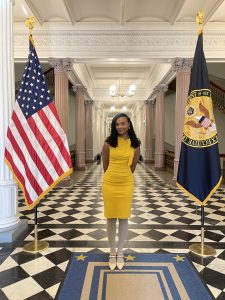By Adam Stone

As a high school student, Starla Santana read Just Mercy by Bryan Stevenson. A number of cases in the book involved kids facing death row and life sentences. At the same time, her parents worked in law enforcement.
“Hearing from them that a lot of what happened was out of their hands once it was given to the courts, it piqued my interest. I thought: Clearly the court is where all the major decisions are being made,” she says.
Now a UBalt Law student, class of 2026, she has come a long way since that initial realization.
During a quick undergrad (she’d already earned an associate’s degree while in high school) her interest migrated from criminal to national security law, and then she herself migrated — from Florida to Baltimore, to attend law school in proximity to the D.C. area.
Smart move, as it turns out. She promptly landed an internship at the White House’s National Economic Council. Two weeks in, she was hired at the National Space Council, after getting herself in front of Tahara Dawkins, who was then working as chief of staff at the space council.
“Starla actually contacted me shortly after she started her internship at the White House and told me of her interest in space,” Dawkins says. She invited Santana to help with an upcoming event on short notice, “and she volunteered for anything and everything she could. She ended up being invaluable to the event.”
When Dawkins invited Santana to apply for an opening, she jumped at that chance. “Space is such a cool frontier,” Santana says. “It’s emerging and it’s new, and there’s no case precedent. What does it look like to even create that roadmap?”
As the space council was being chaired by Vice President Kamala Harris at the time, Santana got the chance to help move that process along, assisting various directors with their research. “We had to attend meetings and conferences and make statements and push out policy,” she says. “I made sure those talking points were accurate, were up-to-date.”
National security played a big role in the work, since satellites factored into the war in Ukraine. “We were getting agencies to agree on how we were going to operate. We conducted a lot of inter-agency meetings…we met with generals at the Pentagon, people who headed different intelligence community agencies,” she says.
If it isn’t already obvious: Starla is a powerhouse who puts her hand to everything with gusto. From serving on UBalt Law’s Student Bar Association, to working in the dean’s suite, to externing with the Air Force Judge Advocate General (JAG) Corps, where she’s currently helping to ensure military members have portability in their professional licenses as they move from state to state on assignment.
Juggling all of that seems to come naturally. “While I was in the midst of getting my associate’s degree in high school, I was a three-time national team member for the sport of tae kwon do, along with having a job as a swim instructor,” she says. “It’s in my nature to juggle a multitude of things at a high level. That’s sort of one of my gifts.”
UBalt Law Professor David Jaros concurs. Santana took his Criminal Law, Evidence, and Introduction to Legal Writing courses. His letter of recommendation helped her land her White House internship.
“She is incredibly motivated and is working hard to accomplish her professional dream,” Jaros says. “In many ways, she embodies some of the best attributes of our students. She’s intellectually excited by the material, and particularly interested in how the material can then be applied in the real world.”
Right now, Santana is planning to apply that material in a future career with Air Force JAG. She says the UBalt Law experience has set her up for success.
“I took a leave of absence when I got politically appointed, and the university was nothing but supportive in that journey,” she says. “They have been supportive of all my endeavors.”
Adam Stone is a writer based in Annapolis.
